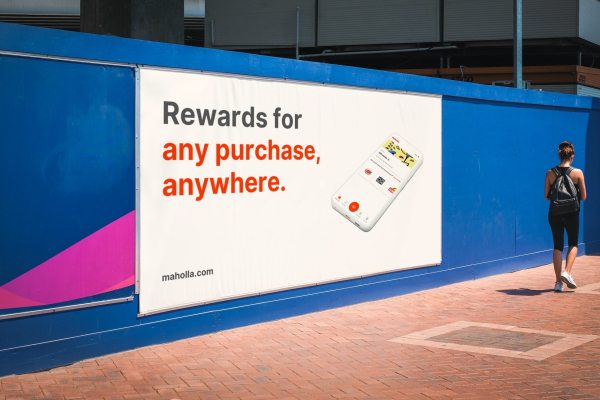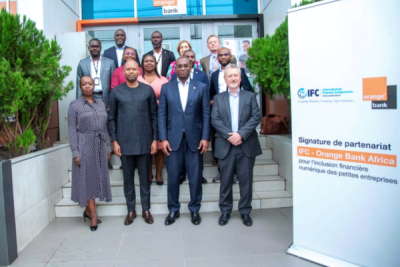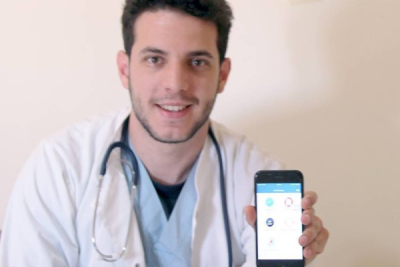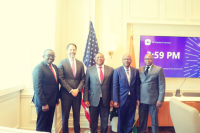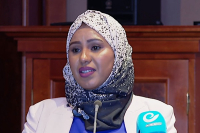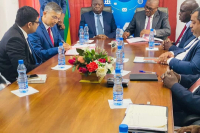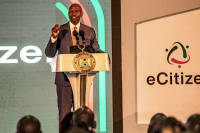The African e-mobility sector is attracting giants from all over the world. In Sudan, a tech entrepreneur has partnered with his friends to establish a solution to compete in his country.
Tirhal is a technological solution developed by a Sudanese start-up. It connects passengers and drivers in four regions of Sudan. Based in Khartoum, the start-up was founded in 2016 by Mohamed Elzakey, Omer Elzakey, Yaser Abba, and Siddig Eltaj. Since its launch, it has already raised approximately $500,000 to support its growth and develop its technology.
"Tirhal's vision is to work to facilitate people's lives by providing various transport services that suit all groups," the platform states.
The mobile App is available on iOS and Android. Users register by creating an account, allowing them access to various features of the app. To take a ride, users simply input their destination, the type of vehicle, and the starting point, and Tirhal displays the fare for the ride. It is also possible to book a taxi for a future ride.
The start-up also offers delivery services, such as delivering parcels and taking orders from restaurants. Tirhal has a fleet of more than 200 motorcycles. For taxis, the start-up works with 2,900 vehicles that have already traveled more than 100,000 kilometers. A laudable record, despite rocky beginnings.
"When we started, we only had three cars, my uncle's and two of my friends'. Today, we have 45,000 drivers and 4.5 million customers," Mohamed Elzakey explained in 2019.
Tirhal charges 10% of the ride fare. This is a low percentage compared to what start-ups operating in the sector earn. However, this strategy, coupled with the quality of the fleet's vehicles, has allowed the start-up to dominate the Sudanese market. According to Play Store statistics, the Android version of the application has already been downloaded more than a million times.
In 2023, it was among the finalists of the AfricaTech Awards, an event that took place last June 15 on the sidelines of the Parisian technology exhibition, VivaTech.
Adoni Conrad Quenum
In a bid to analyze data on South African consumer behavior, tech entrepreneurs have decided to set up a custom application.
Maholla is a technological solution developed by a South African start-up. It allows users to earn bonus points on all purchases made. The start-up, based in Amsterdam and Cape Town, was founded in 2021 by Adam Reilly and Jed da Silva. Since its launch, it has raised approximately $2.1 million to support its growth, among other things.
The application is available on iOS and Android. Users create an account with their email and phone number and then begin scanning their receipts on the app. Regardless of the store where the purchases were made, users will earn bonus points which can be accumulated and exchanged for various gifts such as airtime, access to the in-app games, etc. Users earn more points when scanning receipts from the start-up's partner brands.
Data collected by Maholla is used for marketing purposes. "Data collected by more than half a million receipts on the Maholla app indicate that members of our youth are turned to wholesalers and bulk retailers to make ends meet," Adam Reilly, co-founder of Maholla, explained in a report. The app collects data on the consumption habits of South Africans, which could help its partner firms adjust their policies as needed.
At present, on Android, the App has passed 100,000 downloads and it successfully raised $1.5 million in a funding round last April. Maholla has recorded more than 8.5 million receipts, according to its data.
Adoni Conrad Quenum
As Africa experiences a rapid digital transformation, countries on the continent grapple with digital security issues, and governments double down on efforts to protect various platforms that may be subject to cybercriminal attacks.
South Africa's Department of Justice and Constitutional Development (DOJCD) has been fined 5 million rands ($268,000) by the Information Regulator (IR), according to the South African government's official press agency.
The fine was levied following the DOJCD's non-compliance with the Personal Information Protection Act (POPIA) and a previous antivirus software license renewal order issued by the regulator.
"The enforcement notice required [the department] to provide proof within 31 days of receipt of the notice that the Trend antivirus license, the SIEM [Security Information and Event Management] license, and the intrusion detection system license had been renewed," said the regulatory body.
The notice sent to the department specified that if it failed to comply with this requirement by June 9, 2023, it could face a fine of up to 10 million rand.
As the Department of Justice failed to comply, "[...] the regulatory body concluded that it did not comply with the enforcement notice served on it under POPIA. As a result, the regulatory authority fined the department an administrative penalty of 5 million rand for non-compliance with the enforcement notice," added the regulator.
In September 2021, the ministry suffered a major ransomware attack. Documents containing personal information were compromised and many files were lost. This attack disrupted courts’ operations and all electronic services provided by the ministry for several months.
Since then, the country's authorities have undertaken to secure the ministry's digital infrastructure.
Samira Njoya
Although financial inclusion has recently improved in West Africa, small businesses in the region still consider financing a major barrier to their growth. This new partnership intends to change this dynamic by providing loans.
The International Finance Corporation (IFC) recently partnered with Orange Bank Africa, the digital bank of the Orange Group. The World Bank’s private sector arm made the announcement last Monday, July 3. The move, according to the source, aims to effectively and sustainably support, financially, small businesses in West Africa, including those in rural areas.
"This innovative investment demonstrates our firm commitment to leverage the power of digital financial services, especially in regions where financial inclusion remains limited. It also has the potential to set a precedent in digital lending," said Olivier Buyoya, IFC's Regional Director for West Africa.
Under the partnership, the IFC will partly cover loans made by Orange Bank Africa to micro, small, and medium-sized enterprises (MSMEs), in Ivory Coast, first, then in Senegal, and other West African countries, once the digital bank has received approval to operate there.
In detail, the IFC will cover 50% of the $30 million in loans that Orange Bank Africa will provide in the form of microcredits accessible via mobile to its clientele of small businesses and individuals. The bank, which has been operating in the Ivorian market since July 2020, also plans to allocate "larger loans" to local actors in the creative industry. This will enable the 100% digital bank to distribute an additional 300,000 loans by 2025.
According to Jean-Louis Menann-Kouamé, CEO of Orange Bank Africa, the partnership will accelerate the financing of MSMEs with concrete solutions, thus bolstering their productivity, making them more competitive on local and international markets, and creating jobs.
A year ago, in July also, the IFC inked a first agreement with Orange Bank Africa, to increase access to financing for agents and traders operating in the mobile money ecosystem in West Africa.
Samira Njoya
Burundi is getting ready to deploy 5G. Investments in networks are planned to accommodate this technology, which could potentially breathe new life into trade and services based on internet-dependent models.
The commercial launch of 5G mobile technology in Burundi is planned for July 2024. This is indicated in the schedule established by the Telecommunications Regulatory and Control Agency (ARCT) in its "Roadmap for the Deployment of Fifth-Generation Mobile (5G) in Burundi".
According to the regulator, "The first part consists of ensuring the availability of frequency bands identified for 5G but which are currently used for other purposes, through rearrangement and sharing mechanisms of said bands. The second part consists of planning the frequency bands allocated to 5G, and the third part consists of assigning the released and planned frequencies by the end of 2025".
To meet requirements for the launch, traffic-wise, the ARCT plans to assign each operator a continuous band of 60 to 100 MHz in the bands below 6 GHz and at least 800 MHz in millimeter wave bands (above 6 GHz). From next December, the regulator also plans to release spectrum in the 700 MHz, 2.3 GHz, 2.5 GHz, 3.5 GHz, and 26 GHz bands, with authorizations granted to test 5G from January 2024.
Deploying 5G in Burundi is key to the country’s strategy for digitizing its economy, and foster digital inclusion nationwide. Under the ARCT’s roadmap, 5G will not just represent a simple increase in data rates, but it will drive Burundi’s economic digitization.
Also, it will yield new uses, particularly thanks to the decrease in latency times, thus opening the way to new possibilities and applications, especially relative to the Internet of Things and connected objects in general.
According to the GSMA's "5G in Africa: Realising the potential" report, 5G mobile phone networks should represent, across their entire value chain, an economic contribution of $26 billion in Africa by 2030.
Samira Njoya
During his final year of medical school, Imad Chakri came up with the idea of creating a mobile application. It aims to assist doctors and healthcare professionals in their daily work.
PocketDoc is a digital solution developed by a Moroccan startup. It allows users, specifically doctors, to access relevant and practical information to enhance patient care. Dr. Imad Chakri (see photo) founded the startup, based in Casablanca, in 2018.
"Despite memorizing medical information for the past 7 years, I constantly forget important details, whether it's a prescription or a diagnosis when working in the hospital emergency department or a healthcare center. There was no solution, so I had to repeatedly excuse myself from patients to search on Google or call a colleague, or treat the patient's symptoms rather than the underlying cause of their illness," Imad Chakri stated.
The solution offers a mobile application available on iOS, Android, and Huawei's AppGallery. Once they download the application, users can register and gain access to various features. These include a list of over 300 conditions in 23 medical specialties, a medical semiotics dictionary, a selection of ready-to-use medical certificates, and a platform to discuss with doctors and healthcare professionals.
The startup generates revenue through subscriptions from doctors and healthcare professionals, as well as advertising from sponsors. According to Play Store data, its Android version has already been downloaded over 50,000 times.
PocketDoc wants to expand outside its local market. "After launching the application, we noticed significant traffic coming from other countries such as Algeria, Tunisia, Senegal, Guinea, Cameroon, and France. [...] Our goal is to be present in all French-speaking countries," Imad Chakri explained.
Adoni Conrad Quenum
By 2050 Africa’s digital economy could grow to $712 billion or 8.5% of the continent’s GDP. Being a promising area, several African countries, including Côte d'Ivoire, have been taking steps to speed up their digital transformation.
Amadou Coulibaly, the Ivoirian Minister of Digital Economy, inked on June 28, two memoranda of understanding with Cybastion Institute of Technology, a US tech consortium. The Ivoirian sealed the deals during a trip to the US. They will support two major projects in his country, knowingly the establishment of an administrative city and the construction of a data center.
The MoUs will enable the physical regrouping of all Ivoirian public bodies involved in the digital economy. They will also help set up an emergency data center where all of Côte d’Ivoire’s administrative data will be transferred, thus contributing to national digital sovereignty.
Two events led to the signing. The first is a trip to Côte d’Ivoire by a delegation from the US chamber of commerce, in 2022. Next is the signing of an MoU between the Ivoirian Ministry of Digital Economy and Cybastion Institute of Technology on December 15, 2022, during the Africa-USA Summit.
According to Thierry Wandji, CEO of Cybastion Institute of Technology, the new MoUs pave Côte d’Ivoire’s digital revolution.
Côte d’Ivoire, it should be emphasized, is seeking a lot of funds to implement its digital infrastructure program. Last October, the West African country said it needed $3 billion (over CFA2,000 billion) for the project.
Besides the recent MoUs, the two parties signed a framework contract to bolster cybersecurity support in Côte d'Ivoire.
Samira Njoya
The adoption of AI will have a significant impact on the continent. To foster sustainable adoption of AI in Africa, creating positive ecosystems among stakeholders is essential. This includes policymakers, research institutions, businesses, startups, and government agencies, working together to ensure the technology's long-term viability.
Ethiopia’s Ministry of Innovation and Technology announced, on June 30, it is finalizing a draft national AI policy. The policy aims to harness the potential of AI technology and promote its responsible and sustainable implementation nationwide.
Over the past five years, Ethiopia has witnessed significant growth in its AI sector, prompting the need for a well-defined policy framework. The draft AI policy document addresses crucial policy issues, focusing on both the existing realities and future directions for AI development and growth in the country.
The policy encompasses various key areas, including data management, human resource development, research and development, assistance and encouragement, infrastructure, law and ethics, and cooperation and coordination. By addressing these critical aspects, the Ethiopian government aims to create an enabling environment for AI innovation and adoption while safeguarding the rights and well-being of its citizens.
Huria Ali, Minister of State for Innovation and Technology, emphasized the importance of the draft policy, highlighting its incorporation of national guidelines for data sharing, research quality and ethics, regulatory frameworks, and guidelines for the utilization of human resources. She emphasized the collaborative nature of the policy, calling for the active involvement of regional states, municipal administrations, international institutions, partners, and stakeholders in its implementation.
Taye Girma, Deputy Director General of the Ethiopian Institute of Artificial Intelligence, expressed the institute's commitment to transforming Ethiopia into a center of excellence in AI. He emphasized the significance of developing and utilizing AI technology to propel Ethiopia's growth and development.
The development of the draft national policy on AI involved extensive collaboration. The Ethiopian Institute of Artificial Intelligence, the Ministry of Innovation and Technology, Addis Ababa University's Policy Research Institute, representatives from the private sector, and other stakeholders actively participated in its formulation. This inclusive approach ensures that the policy reflects a wide range of perspectives and is aligned with Ethiopia's unique needs and aspirations.
As Ethiopia nears the finalization of its national AI policy, the country is poised to position itself as a hub for AI innovation and advancement. With a comprehensive framework in place, Ethiopia aims to leverage AI's transformative power to drive economic growth, enhance public services, and address societal challenges while upholding ethical standards and ensuring inclusivity.
The Ministry of Innovation and Technology is set to unveil the finalized national policy on artificial intelligence in the coming months, heralding a new era of AI development and deployment in Ethiopia.
According to the “State of AI in Africa 2023 report,” The advent of artificial intelligence (AI) in African countries will have a significant impact on various aspects of life that involve human intelligence and interaction. AI technologies can be utilized by businesses and institutions to customize tasks, streamline processes, foster innovation, and enhance and support staff operations.
By 2030, PwC predicts that the global gross domestic product (GDP) will witness a significant boost of over $15 trillion due to the integration of AI and related technologies.
Hikmatu Bilali
In 2021, Gabon started a three-year acceleration plan for economic transformation. This comprises several priority projects including the construction of a national datacenter to store all administrative data.
Last Thursday, June 29, Gabon's Minister of Digital Economy, Jean Pierre Doukaga Kassa, and the CEO of the Indian company Shapoorji-Pallonji, Ransit Gajave, signed a memorandum of understanding for the construction of a national data center in Gabon.
The Ministry of Digital Economy said on social media that the project is a high-priority one. Thus, “he instructed the general manager of the Digital Heritage and Infrastructure Company (SPIN) to sign the memorandum with Shapoorji-Pallonji, which holds a leading position in India for data center construction.”
Before the MoU’s signing, a delegation from the Indian contractor was in Gabon last March. At the time, the Asian firm said it wanted to help the African country design, build, and maintain its digital infrastructures, including data centers.
The national data center is extremely important for the Gabonese government and that is why the minister of digital economy quickly sealed the deal with Shapoorji-Pallonji. The official was well aware of the firm’s experience and achievements in Africa, including Egypt, Ghana, and the Democratic Republic of Congo.
Building the infrastructure, according to Doukaga Kassa, aligns with Gabonese authorities' ambition to make Gabon a digital hub in the Central African sub-region.
Samira Njoya
The adoption of technology in all government transactions is emerging as the solution to the bottlenecks caused by corrupt officials who divert government revenues from their intended destination in Africa's public sector.
The Kenyan government launched the e-Citizen Portal, on June 30, providing citizens with access to over 5,000 government services. This digitalization initiative aims to streamline processes, foster transparency, and minimize corruption.
Under President Ruto's leadership, all ministries, departments, and agencies have digitized their services for the portal. The platform also offers easy access to essential healthcare services, revolutionizing healthcare delivery.
President Ruto announced that citizens can access the services through the e-Citizen platform's USSD code *2222# as well as Gava Express, an offline government service in collaboration with banks and fintechs.
“Gava Express will be available in more than 250,000 M-Pesa shops, 28,000 KCB shops, 40,000 Equity shops, and 22,000 Cooperative Bank shops to serve those without smartphones,” he said
The e-Citizen Portal enables citizens to own and manage their health records and engage in interactive sessions. According to the President, the system eradicates inherent inefficiency, corruption, wastage, and discrimination present in human interactions.
With the e-Citizen Portal, Kenya embraces technology for efficient public service delivery, transparency, and citizen empowerment. The government's vision of a digitized and inclusive future becomes a reality.
Hikmatu Bilali
More...
The Democratic Republic of the Congo, like many other African countries, has a huge potential for tourism. Here, we take a look at a startup that showcases this potential, both to members of the Congolese diaspora and foreigners.
Yebo is a digital solution that enables users, mainly foreigners and members of the African diaspora, to visit the Democratic Republic of Congo on tailor-made tourist tours. The platform was developed by a Congolese startup, founded by Nelson Badibangi in 2021.
According to its developers, "Yebo is an innovative solution that brings together all tour operators in one place with the best tourism service offers, to make it closer to local and international consumers."
Users can access Yebo’s services via mobile, through a dedicated app. All they need to do is register and explore available offers. It is possible to choose a tour, based on one’s tastes and means. There is also a search bar which helps filter tours, based on users' preferences.
With Yebo, tourists do not have to go through any hassle. Transportation during the trip, short-stay accommodation, sightseeing and visits to private parks and/or tourist sites; the solution takes care of everything. The startup also assists with the administrative procedures necessary to obtain a visa. Users can access the Congolese embassy website from the Yebo platform.
At present, the startup offers over 52 tourist circuits. During the Canadian week in Kinshasa in June 2023, it won a prize for its great impact on cooperation between Canada and the Democratic Republic of Congo.
Adoni Conrad Quenum
ICT plays a central role in the digital transformation that is a priority for many governments worldwide. To accelerate the realization of their digital ambitions, countries are exploring avenues for collaboration.
The Angolan government announced on June 27 the start of tests on a fiber optic connection with Zambia. The Minister of Telecommunications, Information Technology, and Social Communication, Mário Oliveira (pictured), told the press about the tests during the visit of a parliamentary delegation from the Southern African Development Community (SADC).
According to the minister, the tests align with Angola's objective of becoming a telecom hub. A few days before the tests began, the two nations signed a memorandum of understanding to boost their cooperation in the field of fiber optics and space technology.
In this context, the minister stated that the country will provide satellite services to Zambia and South Africa in the coming months, specifically in the areas of agriculture, migration control, infrastructure, and the environment.
To achieve these goals, the minister called on financial partners who could support the strengthening of cooperation. "Without money, nothing can be done, but with the support of all, we can create robust systems for the continent and the world," said Mário Oliveira.
The new fiber optic connection will promote digital inclusion by improving traffic in the region and reducing the costs of accessing high-speed Internet in both countries. These efforts reflect the gradual progress the country is making in achieving its telecommunications objectives and promoting regional connectivity.
Samira Njoya
South Africa has one of the most advanced technology ecosystems in Africa. The country has numerous tech entities, including startups, incubators, and accelerators. Among them is Start with Seven (Sw7).
Start with Seven (Sw7) is Africa's first virtual acceleration platform for B2B. It brings together B2B tech founders, CEOs, COOs, CFOs, mentors, and investors.
Founded in 2014 by Odette and Keith Jones (CEO), Sw7 provides strategic guidance to pre-seed to Series B startups and funded companies. This South African platform also offers a comprehensive set of guidelines, resources, information, and expertise developed by and with founders, CEOs, mentors, and venture capital firms to boards of companies.
The support is delivered to business managers and entrepreneurs through tailored digital workshops, community calls, and 24/7 access to online resources and content. The platform's guidance extends throughout the fundraising journey. It provides insights on establishing and scaling offshore operations, as well as expanding into the United Kingdom, the United States, or other African markets.
"We combine private one-on-one workshops, advisory, and mentoring sessions on priority areas with peer learning and knowledge-sharing that take place in our private roundtables, group webinars, and on our platform," the platform indicates.
Sw7 collaborates with various technology partners, including Amazon Web Services, HubSpot, Intercom, Miro, and Twilio. These partners offer several advantages, ranging from training and technical support to scaling assistance and enhanced market access.
Melchior Koba
After spending several years in the US, Afery Johnson (picture on the left) returned home to Togo, and set up his transport startup.
Lomé Taxi is a ride-sharing solution developed by a young Togolese company. It allows customers heading in the same direction to share transportation costs. Through this solution, users can travel around the city in cars at affordable rates. Already, the startup operates in 11 designated zones within the urban area of Lomé.
"The carpooling concept at Lomé Taxi emerged from the need to lower transportation costs for our customers. Faced with the repetitive rise in fuel prices, we had to increase our fares, and we noticed a decline in the use of our services due to the high cost of living. Through careful consideration, we found a solution that would allow our customers to continue using our services affordably," said Afery Johnson, founder of Lomé Taxi.
The solution does not require a mobile application. Users can easily access it through a web browser. To do so, they only need to provide information such as the departure date, departure time, departure neighborhood, destination, phone number, email address, and the number of passengers. The last piece of information is necessary to notify the start-up that you are open to sharing your ride with another person.
Besides the web platform, reservations can also be made through social media platforms like WhatsApp. SMS and direct calls are also available methods for contacting the start-up to make a reservation.
Lomé Taxi boasts a fleet of over 25 cars and operates from five offices across the Togolese capital. The fare for a trip downtown is CFA2,000, and CFA3,000 for trips to peripheral areas. The startup also offers a special service for people visiting the country.
"The driver picks them up from the airport to their place of residence. For those who no longer want to rent expensive cars during their stay, the company owner provides his car fleet at very affordable rates, tailored to their schedule," according to the platform.
Adoni Conrad Quenum



